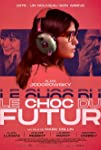Eye For Film >> Movies >> Le Choc Du Futur (2019) Film Review
Le Choc Du Futur
Reviewed by: Jennie Kermode

Cinema has always struggled with depictions of the creative process. Much of it, regardless of the art one practices, is grind, exploring a subject by trial and error, testing and abandoning various strategies, recreating and refining a piece of work over and over again. It bores audiences. Most of what remains happens inside the skull, making it difficult to depict visually. For this reason, stories about artists, writers and musicians tend to focus on eccentricity or obsession, or on insecurity and the distress that develops when that process stalls. Le Choc Du Futur has a measure of the latter but is grounded in its understanding of its heroine. Its focus is on depicting the way that deliberate searching, accidental experience and unrestrained imagination combine to make creative leaps possible.
Does it succeed? Yes and no. Reading reviews, it's plain that a number of critics have failed to connect with this at all, which makes it probable that many viewers will do likewise. This is not a film for a lazy audience. It requires imaginative engagement and a degree of openness to experience not dissimilar to its heroine's. Though she may seem to be engaged in everything but what she's supposed to be doing, there is work going on all the way through it, crowding into other spaces until it becomes overwhelming. Alma Jodorowsky does the heavy lifting, conveying to the audience what most of those around her cannot see.

She is Ana, and when we meet her she's crashing in a flat that belongs to a friend of a friend, content to sleep on a couch (which she also, rather inconsiderately, jumps about on) as long as she can have access to the wall of synthesizer gear at the other side of the room. It's 1978 and decent quality electronic equipment is only just becoming available outside the broadcasting centres and universities where the first experimentation with this kind of music took place. Ana consumes music the way other people consume food. Among the many guests who join her in the flat over the course of the day is a man who has dedicated three decades of his life to travelling the world in pursuit of the latest sounds. It's he who brings the tape which first exposes her to the developing Sheffield electronica scene, and within seconds she's hooked. Not everybody hears what she hears in the music, however, nor shares her vision of how it sill shape the culture of the future. As she explores what she can do with this new sound, she must continually do battle with unbelievers.
The soundtrack to this film is every bit as vibrant as you might expect, making it a pleasure to watch, but it's not the only source of energy. Jodorowsky throws herself into the role, filling up the screen with artistic passion and youthful enthusiasm. Director Marc Collin (who also wrote the original music) handles the pacing well, knowing when to slow down and let viewers relax, yet the film always retains a certain intensity that's enhanced by his electric use of colour. Production designer Marco Melaragni has created a blend of the best, most iconic and most charismatic styles from an eclectic era. The orange curtains, sunburst clock and omnipresent cigarettes create an unmistakable sense of the time. The sleazy male characters whose advances Ana perpetually has to fend off (something that most women who have worked in the industry will relate to) really dress the part, but her choices convey an effortless cool even as they tell us something about her past and, thereby, about her cultural journey. The different preferences exhibited by older and younger characters tie into their relationship with the music and their awareness (or not) of the rapidly advancing future.
Ending with a dedication to the women who pioneered electronic music, this is a fine tribute. Yes, Ana is dogmatic and sometimes unreasonable, but that's part of what it means to be young and on the verge of great discoveries. Her rejection of rock music is as much a rejection of the past, of male domination of the industry and of the need for composers to depend on unreliable musicians, another avenue for exploitation and disappointment. In other words, you don't need to be a fanatic to enjoy this; you just need to make room for its heroine to express herself. In the end, that's what her hunger for the future is about.
Reviewed on: 10 Nov 2020
















